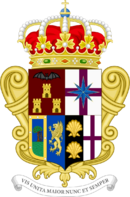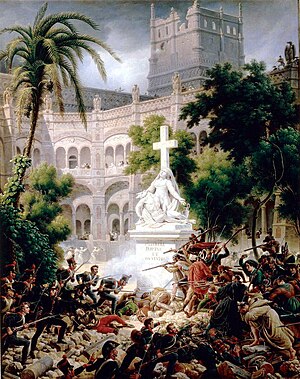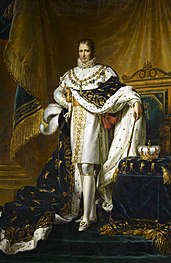Pronunciamento
Part of a series on the |
|---|
| History of Paretia |
 |
The Pronunciamento (Luzelese translation: Pronouncement), also referred to as the Paretian Revolutionary Conflict (Luzelese: Conflito Revolucionário Paretiano), was a period of revolution and turmoil that took place in Paretia spanning over fifty years, from around 1782 to 1835, it is considered part of the greater Euclean Spring which saw the rise of revolution and uprisings across the continent. These events eventually culminated into the creation of a constitutional monarchy in Paretia in 1821, which lead to the liberalization and weakening of the monarch's original powers greatly.
Rule of Rafael II
The revolution was inspired heavily by events that lead to the Etrurian First Republic, and displease with rampant corruption and decadence of the ruling class. Rafael II, known for his dictator-like rule and flamboyant lifestyle, lived most of his life in his mansions across the country, his predecessor saw the growth of Paretian economic status, however it had begun to wain and famine and disease became common in cities. In 1782, Rafael II would dissolve his council of advisors, the Cortes da Paretia, made up of smaller leaders from around the country. This lead to outrage from the populace and the creation of the Pronuncistas, a group that supported republicanism, nationalism, and rationalist thought. This group was lead by Leandro Tavares, a young leader and former captain in the Paretian Armada. He would also work with other revolutionaries, including Silvio Lourenço, Josué Sapateiro, and Jacob Gasol de Rasilla. Sapateiro was arrested and imprisoned in 1785 for speaking out in front of the Palacio do Solo.

Throughout the 1780s and 90s anti-government sentiment grew. During this time the Weranian Revolution and formation of the Weranian Republic saw massive support from Paretian Pronuncistas. Eventually the Etrurian First Republic would invade Paretia and other neighbors in the Etrurian Revolutionary Wars during this time, the war became greatly unpopular as it put Paretia further into poverty, casualties from the war greatly angered the country. The war saw Etruria attempt to form a Ecumenical Republic in Paretia, many of the Paretian Pronuncistas however aligned with Weranian revolutionary thought and were against Etrurian invasion and the ideals of the Pantheonisti in Etruria, so they also saw the war as a means for patriotism fighting for the sovereignty of Paretia. Etruria-occupied parts of Paretia became a puppet state known as the Paretian Blessed Republic. By the 19th century the war with the Republic of Heaven put further strain on the country, for most of the war the Paretian forces were routed around the western reaches of the country, but they were still heavily aided by revolutionary and other militias.
In 1806 the turmoil began to rise greatly upon the return of Tiago IV, claimant to the throne and heir of the House of Azulejeiras, which ruled the country until 1735 when the House of Sagreira took over. For nearly a half a century it was rumored that the line was broken and their heirs dead. Despite being a monarch, he was supportive of the revolutionaries of Tavares, and was willing to work a compromise with them. By this time Rafael had little support even in the aristocracy of the nation, who saw him as an unfit king who needed to be replaced with a new one.
Revolution and overthrow of Rafael II
During the turmoil, calls for secession by Tosutons and Esmeirans began to take hold. Revolutionary militia forces, mostly lead by Tavares and Tiago IV, would begin to gain military support. In 1809 Rafael II would order his forces to capture a group of revolutionaries in Esodos and followed by their execution on the spot, known as the Massacre at Esodos. With the war with Etruria beginning to come to a close, the revolutionaries began to focus on the Paretian monarchy. By 1810 Ardesia would declare independence against a weakened Paretian colonial army, and eventually saw the loss of the colony. Rafael II would leave Precea out of fear of capture as revolutionary forces saw military backing. Ambushes and bombings became a common tactic of the Pronuncista Movement, and saw the killing of many of Rafael's family and advisors. In 1810 revolutionary forces revolted against Rafael II and raised forces to capture the king, who by then was in hiding. Loyalist forces were greatly outnumbered as it seemed Paretia fell into a state of anarchy, with many factions claiming the throne or their own governments. Many self-proclaimed monarchists would side with the revolutionaries due to promises to work on creating a constitutional monarchy with Tiago IV.
The end of Rafael II's rule was the Storming at Montoya Palace, where loyalist forces protecting the king were defeated by revolutionaries and King Rafael and his family executed, their clothing and dresses were flown on flag as revolutionaries left the palace victorious. A power vacuum in Paretia over the next month lead to other revolutionary movements and rebellions to take hold, namely separatist movements. The largest was the separatist movement in Tosutonia, there also were rebellions in Esmeira and Vicisa. Tavares would work with pro-Tiago forces to defeat these rebellions at first.
Rule of Tiago IV


Tavares and Tiago IV would eventually be able to gain hold on most the country by the end of the May, and Tiago IV would be instated as the new King of Paretia in Precea on the 21st of May. Tiago IV would make a group of advisors tasked with making a constitution, which included various groups including the Pronuncistas, other factions included monarchists, clergy, representatives of the constituent kingdoms, and a group known as the Council of Workers, which represented Paretian workers. They would become the leading draftsmen of the constitution of Paretia. A divide began to split the Pronuncista movement, many republicans lead by Leandro Tavares would split the faction in half, becoming known as the Revolutionary Pronuncists. The others, now known as the New Pronuncists of Paretia, lead by Silvio Lourenço and Josué Sapateiro, were much more willing to work with the monarchy, their ideology was much more centered around liberalism. Tiago would have a constitution in 1811, however it was rejected by the Revolutionary Pronuncists.
Still during Tiago's rule, rebellions that sparked during the initial revolutions still were an issue. Separatists in Tosutonia still would conduct attacks on Paretian forces, in Esmeira the city of Vallenoche declared independence as the Republic of Esmeira with a government similar to the Etrurian First Republic. Tiago and Tavares would have the military and militia put down the rebellions with the goal of maintaining a "stable and united Paretia during it's revolution", in order to maintain a "difference" from Rafael II, Tiago IV ordered captured rebels not to be executed like what happened at Esodos.
Tiago IV's relationship with the revolutionaries deteriorated rapidly as Tavares was becoming impatient with Tiago's constitution drafts being considered too conservative. Tavares and the Revolutionary Pronuncists would reject five constitutional drafts by Tiago and the advisors, in 1814, after the fifth one, Tavares and the Revolutionary Pronuncists would leave the advisory council. He would begin to call for another revolution to abolish the monarchy completely, for the most part the Revolutionary Pronuncists used peaceful means against Tiago IV until October 1815 when he called upon militias and pro-revolution military to rise up, he would then proceed to commit the Regicide of 1815, which killed the two eldest sons of Tiago IV, this would lead to Tiago IV to ban them from the country and beginning of fighting again. Tiago would be able to have a larger army to battle revolutionaries due to support from moderates, constitutional monarchists, and conservatives. He would keep the Revolutionary Pronuncists at bay until his death in 1816.
Formation of Constitutional Monarchy

Tiago IV's successor, Xavier II, was much more pro-revolutionary than his father, but still would fight against Tavares and the Revolutionary Pronuncists during his time. He began to work with Silvio Lourenço and Josué Sapateiro in completing a constitution, he formed another advisory council. He knew the populace was growing tired of the turmoil and wanted a constitution. This stime however he stated that constitutional monarchy will be the only form of government he will accept, this angered the Revolutionary Pronuncists, who still were active, the Revolutionary Pronuncists however in 1818 would grow in size immensly with military supporters. This came after Xavier II called off his military advisors from the advisory council, who then turned to Tavares and rebelled again, this time committing the Regicide of 1818 which killed much of the relatives of Xavier II, Xavier II would survive and subdue any rebellion by 1922.
In 1921 the constitution was completed, it was ratified by all members of the council and it would establish a constitutional monarchy that greatly limited, but not completely remove, the powers of the monarch. It created the Senate of Paretia, a bicameral legislature, the governments of the four constitutuent Kingdoms, and the position of Premier, an elected official that would lead the government of Paretia. The first election was held later that year and saw Silvio Lourenço becoming the first Premier of Paretia.
Tavares was captured in 1922 and imprisoned, but not executed. The Revolutionary Pronuncist movement still would exist, but instead under Martim Barcelos, a captain in the military, who would still lead guerilla tactics for the next decade. In 1933 Xavier II died while at sea in a shipwreck, without a heir to the throne, pro-constitutional monarchy nobleman João III of the House of Pavillon would take control of the monarchy, but was warned by then-Premier Josué Sapateiro to not remove the constitutional monarchy, he would accept this. After, João III's main goal was to rid of the Revolutionary Pronuncists threat, he used more authoritarian measures compared to Xavier II to do so, and by 1935 arrest Barcelos and completely disbanded the Revolutionary Pronuncists Movement.




